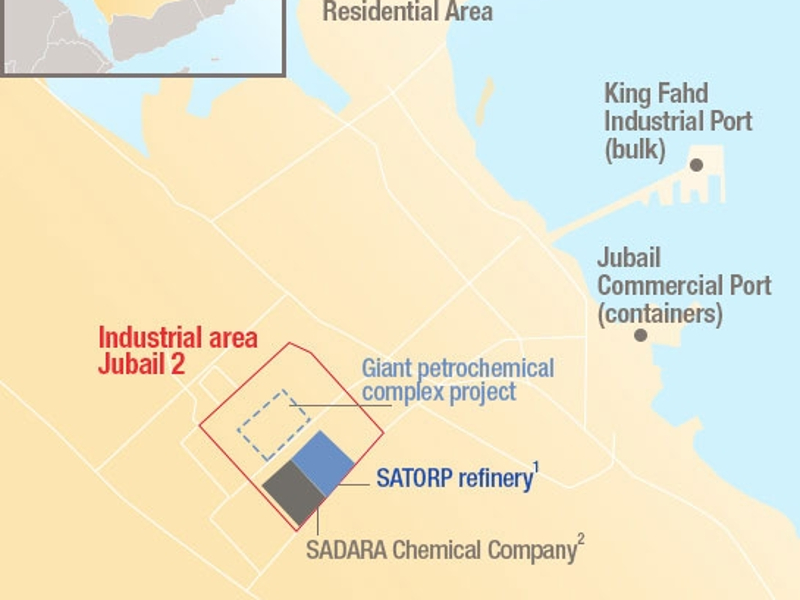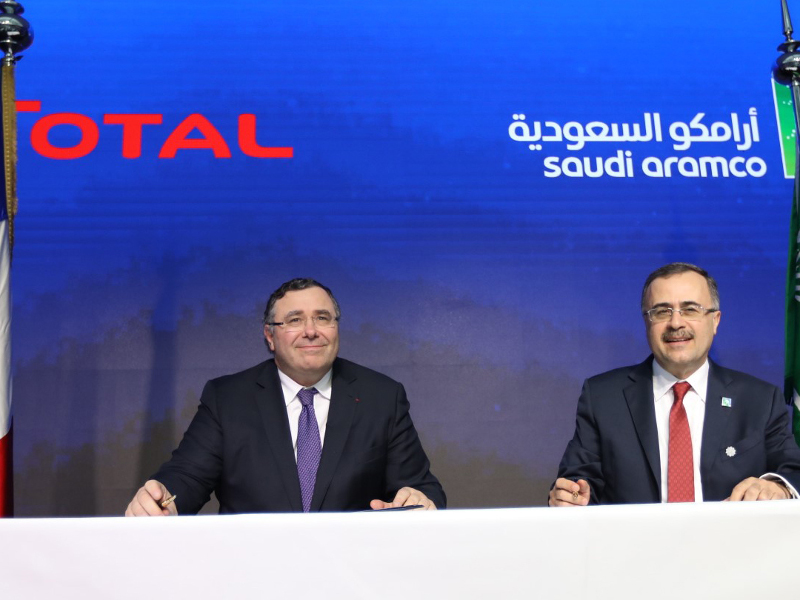The Saudi Aramco Total Refining and Petrochemical (SATORP) refinery located in Jubail, on the eastern coast Saudi Arabia, is set for a $5bn expansion project to add a massive integrated petrochemical complex.
Owned and operated by SATORP, a joint venture of Saudi Aramco (62.5%) and Total (37.5%), the refinery complex has been operational since 2014.
The new petrochemical complex will be built next to the refinery and will start operations in 2024. It will house a mixed-feed steam cracker to produce 1.5 million tons per annum (Mtpa) of ethylene and related high-value-added petrochemical units.
The petrochemical complex will also feed other petrochemical and specialty chemical plants owned by other companies in the Jubail industrial area.
Project Gallery
-

The Saudi Aramco Total Refining and Petrochemical (SATORP) refinery has been operational since 2014. Image courtesy of Total.
-

SATORP is owned by Saudi Aramco (62.5%) and Total (37.5%). Image courtesy of Saudi Aramco.
-

The SATORP refinery is located within the Jubail industrial area, on the Arabian Gulf Coast of Saudi Arabia. Image courtesy of Total.
-

Saudi Aramco and Total signed an MoU do develop an integrated petrochemical complex next to the refinery in April 2018. Image courtesy of Saudi Aramco.
Involving an overall investment of $9bn, the new Jubail petrochemical complex project is expected to yield 2.7Mt of high-value chemicals a year and create up to 8,000 direct and indirect employment opportunities.
SATORP refinery capacity
The SATORP refinery is capable of processing 440,000 barrels per day (bpd) of heavy, high-sulfur crude oil to produce 22 million tonnes (Mt) of refined petroleum products a year.
The refinery throughput is expected to be increased to 460,000bpd, after debottlenecking one of the two crude processing trains of the facility in 2020.
Jubail petrochemical complex make-up
The new petrochemical complex is proposed to be built downstream of the existing SATORP refinery. It will comprise a mixed-feed cracker unit, which will process 50% ethane and 50% refinery off-gas. It will be the first mixed-feed cracker unit in the Gulf region to be integrated with a refinery.
The petrochemical complex will produce 1.5Mtpa of ethylene along with other high-value petrochemical products.
SATORP refinery background and development details
Saudi Aramco and Total signed a shareholders’ agreement for the design, development, and operation of a 400,000bpd full-conversion petroleum refining facility in Jubail in June 2008, that led to the establishment of the joint venture company SATORP in August 2008.
The engineering, procurement, and construction (EPC) contracts for the refinery were awarded by July 2009.
Construction works on the project were started towards the end of 2010 and completed in October 2013, while commercial operations were started in June 2014.
Further, the processing capacity of the refinery was increased to 440,000bpd in early-2018, which increased the annual output to 22Mt of refined petroleum products, including 700,000t of paraxylene, 150,000t of benzene, and 200,000t of propylene.
Saudi Aramco and Total signed a memorandum of understanding (MoU) to build an integrated petrochemical complex downstream of the existing refinery facility in April 2018.
Further, a joint-development agreement for commencing the front-end design and engineering (FEED) work for the new petrochemical complex was signed in October 2018.
SATORP refinery location and infrastructure facilities
The SATORP refinery is built on a 480ha-site within the Jubail Industrial City. The full-conversion refinery complex includes two crude processing trains, a 103,000bpd delayed coker unit, two distillate hydrocracker units, a sulfur recovery unit, and a fluid catalytic cracking unit, along with port loading facilities and other associated infrastructures.
The refined products of the facility include liquefied petroleum gas (LPG), gasoline, jet fuel, diesel, petcoke, paraxylene, benzene, and propylene, which are exported to the US Gulf Coast, European, and Asian oil markets.
The feed crude oil for the refinery is supplied from the Arabian Heavy crude supply system.
The electricity for the refinery operations is supplied through two 230kV underground transmission cables connecting an onsite substation with the Jubail-2 230/34.5kV Substation-2.
Contractors involved
Jacobs Zamel and Turbag Consulting Engineers (Jacobs ZATE), a subsidiary of Jacobs Engineering, was awarded a two-year general engineering service contract renewal for the SATORP refinery complex in August 2018.
Jacobs ZATE had also provided the front-end engineering design (FEED), detailed design, procurement, construction management, and commissioning services for the project.
KBR was awarded a contract for debottlenecking the second crude processing train of the refinery in February 2019. It has engaged China’s Wison Engineering Services as the subcontractor for the same.KBR was also awarded a three-year general maintenance services (GMS) extension contract for the SATORP refinery in May 2019.
